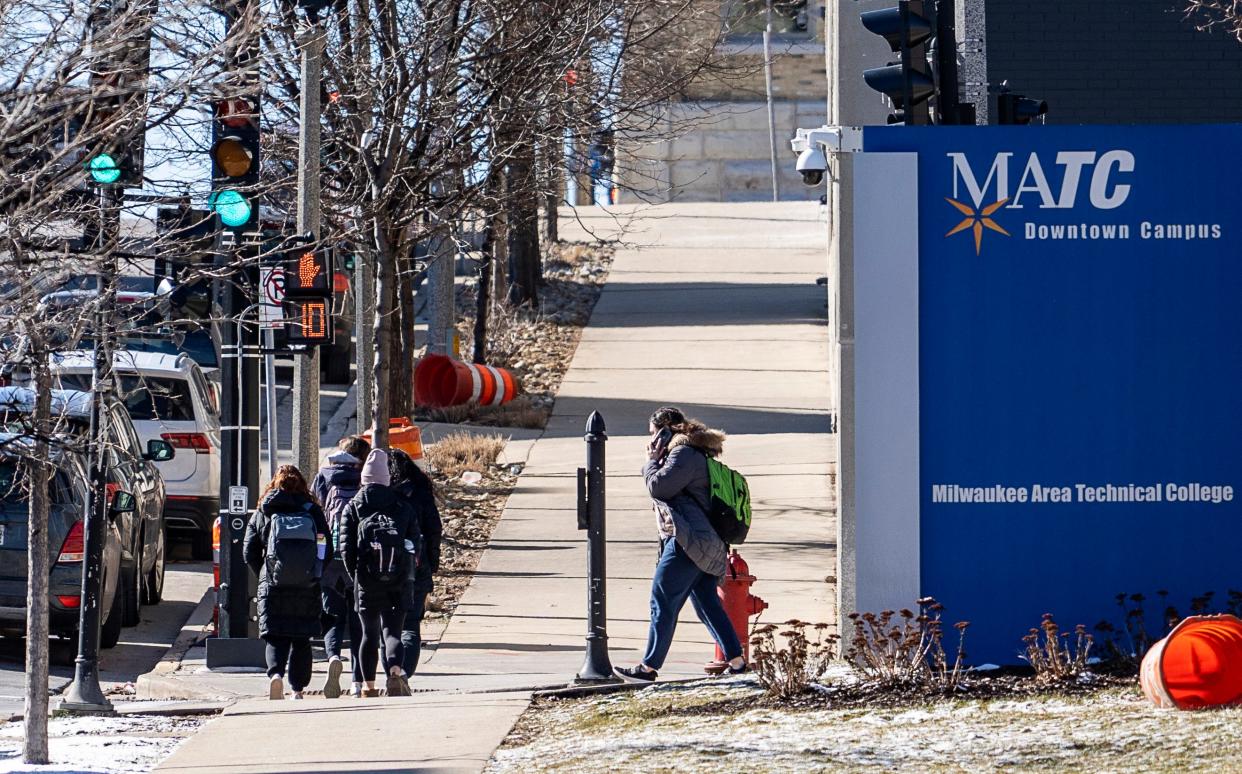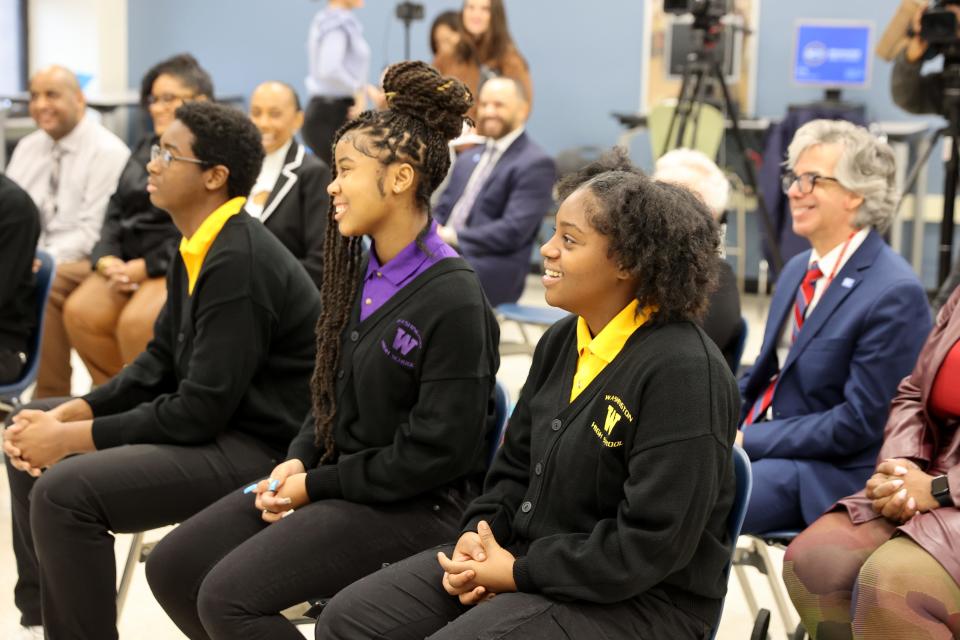What's on the horizon for the next MATC president? Questions about college access, equity

On a Thursday afternoon in late March, a group of Milwaukee Area Technical College students reflected about a key time in life: when high school is nearly over, and questions about college are on the horizon.
“Study sessions helped me with my grades a lot,” MATC student Devin Hayden told a group of Milwaukee Public Schools seniors. Hayden was talking about enrolling in Smart Start, a program designed to help MPS graduates transition to MATC or the University of Wisconsin-Milwaukee. “Just learning about the different ways you can study really, really helped me with achieving the goals and the grades that I wanted,” Hayden said.
Of the Milwaukee Public Schools students who enroll in a college or university, about 50% go to MATC or UW-Milwaukee, according to data from MPS. Those three public institutions have created programs over the last decade intended to support students as they enroll in, pay for and earn diplomas from those schools.
MATC will soon choose a new president for the first time in a decade, replacing Vicki Martin, who has been at the institution in various roles for 35 years.
Comments submitted as part of a survey used in its presidential search suggested students, staff and faculty see extreme potential in MATC, as Milwaukee's public two-year college, to make an impact in Milwaukee, given its diversity and reach in the city. The college enrolled more than 30,000 students in fall 2023, more than half of whom are people of color and most of whom are part-time students. MATC is known for two-year degree programs, as well as specialized technical programs and adult education classes like GEDs and English as a second language.
MATC named four finalists for the presidential role on April 5. Its goal is to name a new president in time for a July 1 start date.
Next MATC president will need to 'drive a vision'

One major college access initiative in Milwaukee is M-Cubed, or M³, a dual-enrollment program launched in 2015 that gives free college credit from MATC or UW-Milwaukee to MPS high school students. In 2022, M-Cubed grew to include the Smart Start summer program, and in January MPS juniors became eligible to apply for direct admission to either school.
In 2016, the college created the MATC Promise, which covers up to 75 tuition credits for certain low-income high school graduates or adults. In 2022, it launched the Checota scholarship program to help students cover costs like housing, child care and transportation.
Joel Brennan, president of the Greater Milwaukee Committee, said that, over the past decade, MATC and Martin have focused on improving college access and making sure tuition isn't a "stumbling block" to enrollment. Those programs are scratching the surface, he said, and going forward, the college's challenge will be to figure out how to expand and deepen the impact of those programs.
"You have to understand how dramatically things are changing at the higher education level. If we're still tied to the old ways of doing things, then we will be left behind," Brennan said.
Gabriel Velez is the faculty director for the Black and Latino Ecosystem and Support Transition Hub at Marquette University. Technical colleges have always been around, he said, but today, more people are questioning the cost of a four-year degree. That's one reason the next MATC president will need to “drive a vision” that takes several big-picture topics into consideration at once, he said: K-12 education, higher education, employment and workforce development.
“’I hear young people talking about, 'It’s a cheaper way to get my four-year degree if I start at MATC.' Or I hear young people saying, ‘I don’t want to go and take a whole bunch of English classes; I want to go get my license to be X, Y or Z. And MATC offers that quickly,'” Velez said.
Milwaukee still scores low in national rankings about quality of life for Black and Latino residents, Velez said. To make progress will take work from people, and organizations, at the heart of Milwaukee's "ecosystem," he said.
“Really, in our entire state, MATC is the one institution that serves the most Black and brown young people,” he said, at least within higher education. “It’s such a nexus of the high school, postsecondary and career space."
New president has opportunity to help 'fight systemic poverty'
The all-campus survey suggested MATC will need to contend with questions not just about how to recruit more students and boost enrollment, but support them through until graduation. One major roadblock is money to pay for degrees: 40% of MATC students either receive financial need-based financial assistance or have an income at or below the federal poverty level, according to data from the Wisconsin Technical College System.
On the enrollment side, Milwaukee high schoolers considering college might be unfamiliar with the admissions or financial aid processes, worry about accruing debt or have pre-existing ideas that two-year colleges are less "real" than four years. Those are all complexities affecting college access programs pointed out by youth ambassadors with Milwaukee Succeeds, a nonprofit focused on education equity, in an interview with the Journal Sentinel.
Deh Nee, a junior at Messmer High School, said programs that give college credit to high schoolers are helpful, but only cover a fraction of the cost of a degree. To help ease stressors about accruing debt, he would like to see more support for high schoolers with loans and scholarships.
“Many people in high school see it as: "Oh, if you go to college, you're still going to be broke. It's a waste of time. Especially if you don't know what you're doing (yet)," Nee said.
Fast Fund, a nonprofit for MATC students created by AFT Local 212, the faculty union associated with MATC, provides emergency financial assistance to students. In 2022-23, the nonprofit spread close to $500,000 across 1,668 students, according to its annual report for things like rent, utilities, school supplies and transportation.
“From my perspective (and) what I do, I’m seeing a lot of our really poor students fall through the cracks on a daily basis,” said Liz Franczyk, executive director of the Fast Fund.
No one person or institution can fix issues of systemic poverty that drive people to drop out of college, Franczyk said. But she said MATC is in a unique position to make a difference.
“Whoever comes into this (presidential) role has a huge opportunity to really fight systemic poverty in this city,” she said.
MATC is 'uniquely positioned to be transformational for Milwaukee'
Catina Harwell-Young is director of engagement and culture at Milwaukee Succeeds. MATC could likely recruit students away from four-year programs, she said, if it made its cheaper two-year programs more "visible" in the city.
“This is supposed to be the place that’s not the traditional four-year college path — which means in less time, and (with) less money — you should have an opportunity to find some sort of employment, or some sort of career," she said. "I think MATC, whoever's next (in the presidential role), needs to do a good job of lifting that up — particularly in high school spaces."
Walter Lanier is president and CEO of the African American Leadership Alliance in Milwaukee, who spent 13 years in various leadership roles at MATC. He said the institution is “uniquely positioned to be transformational for Milwaukee because it sits at the intersection of so many significant sectors," like education, employment, skill building, returning professionals, and others. He said the college is diverse both in the classes it offers and the students it educates.
But more work needs to be done to expand its marketing footprint, he said, and simply make more people aware of its programs. Like many institutions in Milwaukee, he said, MATC's challenge is to build strong working relationships with people in Milwaukee.
“Milwaukee is interesting because, on the one hand, it’s very segregated and siloed,” Lanier said. ”But on the other hand, if you work with intentionality, it’s a very natural and networkable community. You can get around to different places; you can get a lot of touches."
Lanier also said MATC should, from the top down, rely more on the expertise of staff and faculty members who work directly with students.
That's another theme that surfaced in the on-campus survey: the need for the next president to focus on internal culture and as well as the relationship between administrators and other employees. The college's recent history has included concerns from faculty about campus climate. In 2021, MATC drew attention after its former vice president of enrollment management, Amir Law, described a culture of "adverse treatment of Black employees" that led to his resignation.
The Local AFT 212 union, which represents MATC faculty and staff as well as engineers and production specialists from Milwaukee PBS, conducted its own survey before the current presidential search.
Many union members signaled they feel it’s important for the next president to have firsthand experience related to the “daily lives of student-facing employees," said president Lisa Conley. It’s also important for the president to have a record of acting as an advocate for students and public education, she said.
“We best know students, and we best know the conditions on the ground. Sometimes, an institution will have shared governance structures in place, but the administration doesn’t really ask, or listen to or act upon feedback collected,” Conley said. “True engagement and partnership with frontline, student-facing employees is critical so that gaps and other areas for improvement can be effectively identified and addressed. Equally important in top leadership is dreaming big and inspiring ideas that will allow MATC to reach its potential.”
Cleo Krejci covers higher education, vocational training and retraining as a Report For America corps member based at the Milwaukee Journal Sentinel. Contact her at CKrejci@gannett.com. Follow her on Twitter @_CleoKrejci.
This article originally appeared on Milwaukee Journal Sentinel: MATC is preparing to choose a new president for the first time in a decade

